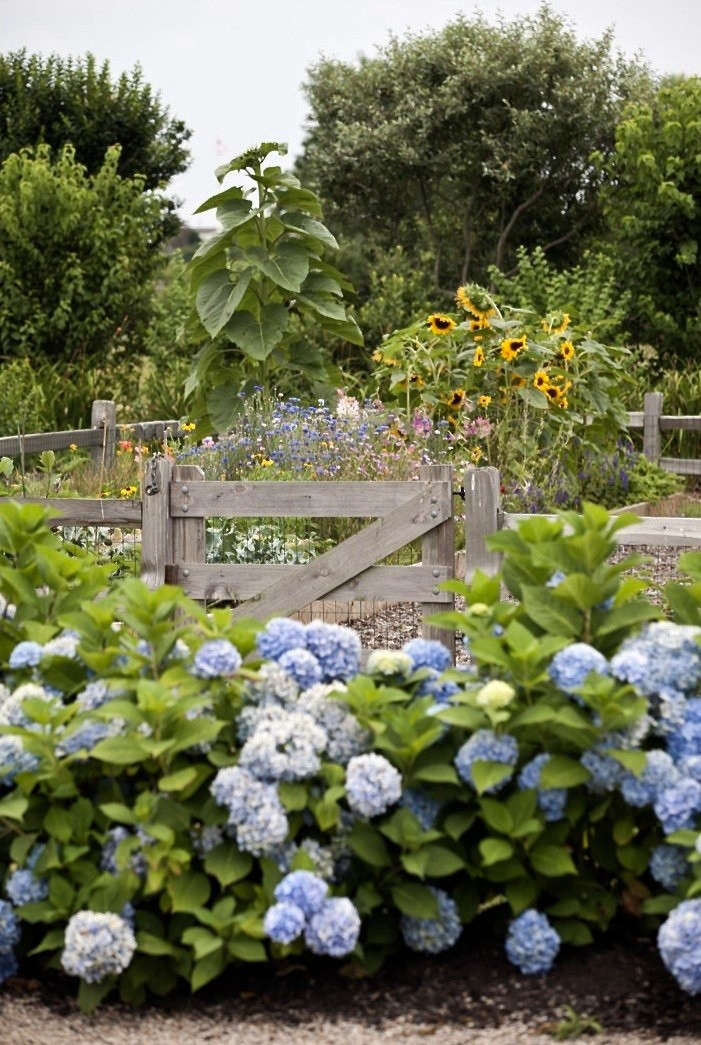Hydrangeas that are blue are not necessarily better than pink ones. But the color is so rare–”hydrangea blue” is not a hue that belongs to any other plant or any other anything in the world–that that how could you not want a splotch of it growing against your picket fence?
And what if I said you could change your everyday-pink hydrangeas into moody blue ones–not overnight, of course, but with barely any more effort than you expended back in fourth grade on your science fair project?
Here’s how to change hydrangeas’ color.
N.B.: Featured photograph by Kendra Wilson, from Landscaping 101: Wild Hydrangeas, 7 Ways.
What hydrangea colors are most common?

Hydrangea blue: How exactly do you describe this particular shade? It is somewhere between violet and blue, existing in that shimmery space where color collides with silver.

Hydrangea pink. Not that there’s anything wrong with pink. But come on:

What changes hydrangeas’ color?
Hydrangeas change color (except for the white ones) based on the pH level of their soil. The more alkaline the soil, the pinker the flowers. To make pink hydrangeas turn blue (or to keep your blue ones from turning pink), increase the acidity of soil. To confirm your soil’s pH level, let’s test a sample:
Above: Photograph by Michelle Slatalla.
First, get a handful of dirt. It only takes a small amount of soil to test the pH level. (Bonus points if you know what “pH level” refers to; I looked it up and learned that “pH” stands for “potential of hydrogen” or, in layman’s terms, the concentration of hydrogen ions in soil. The higher the concentration, the more alkaline your soil. In retrospect, I’m not sure I needed to know this, but thanks anyway Internet.)
What is used to test soil pH?
Next, place the soil sample in a container. Pour distilled white vinegar over it. If the solution fizzes, the pH level is high and your soil is alkaline. (If it doesn’t fizz, then the soil is neutral or acidic; you will not have to amend it as much to made your hydrangeas blue.)
How do you change soil pH for hydrangeas?
Add organic materials to your soil to make it more acidic. Coffee grounds are good. So is ground-up citrus peel. Work the mixture into the soil around the base of your hydrangea plant, and then water it in.
How often should you do this? Save your peels and your grounds in a little bowl on the countertop and whenever the bowl is full, take it outdoors to feed the hydrangeas.
The acidity of the of the soil will slowly increase; by next year, your hydrangeas should look a lot more blue.

Lowering Soil pH with Coffee Grounds
Crushed egg shells will also increase the acidity of the soil. Work them into the ground along with citrus peel and coffee grounds.

As they decompose, the organic materials will add aluminum to the soil (making it more acidic). You can also add diluted Aluminum Sulfate to increase the acidity level, a 4-pound box is $16.18 from Amazon.

Can hydrangeas turn too blue? I suppose it’s possible you’d prefer pink. If so, you can make your soil more alkaline by adding Garden Lime; a 6.75-pound bag is $9.95 from Gardener’s Supply.
For more hydrangea inspiration, see:
- Hydrangea: A Field Guide
- Everything You Need to Know About Hydrangeas
- A Master Class in Pruning Hydrangeas from White Flower Farm















Have a Question or Comment About This Post?
Join the conversation (20)